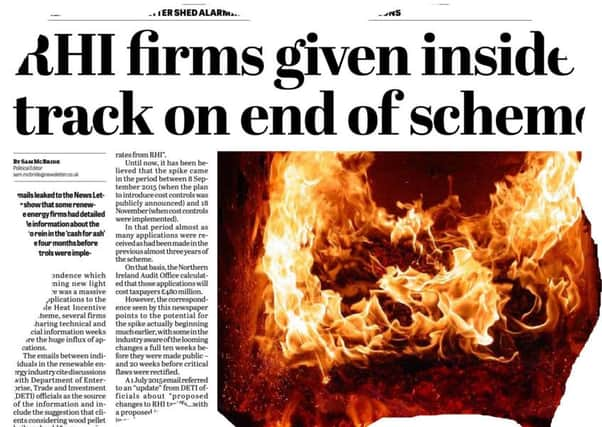Sam McBride: Why it is right to name RHI officials '“ as well as Spads and politicians


Inside were copies of two emails which were sent between individuals in the renewable energy industry in July 2015.
The significance of the correspondence was immediately clear – if these documents were genuine, they showed that detailed information about what the budgetary problems with RHI and the looming cost controls had made its way out of the department as early as 1 July – seven days before officials put advice to the then minister, Jonathan Bell.
Advertisement
Hide AdAdvertisement
Hide AdThe emails show that the industry instantly grasped the commercial importance of what they were being told and prepared to rush applications through before the lucrative RHI rates were capped.
As such, they are critical to understanding why the ‘spike’ in applications happened in autumn 2015.
The News Letter immediately contacted the Department for the Economy last Thursday. The department briefly suggested that if we were to immediately publish the emails in full (something that we did not intend to do at that point because there was insufficient time to allow the individuals sufficient time to respond) it may seek an emergency injunction, arguing that they could prejudice its internal inquiry.
The News Letter instead reported in Friday’s paper that we had obtained leaked emails which appeared to show that officials had passed on commercially sensitive information to the industry.
Advertisement
Hide AdAdvertisement
Hide AdSince then, we have attempted to contact every individual named in the emails in an attempt to fully understand their context and have put a series of questions to the department.
This newspaper has not rushed to publication, but has now decided to publish the names for the following reasons:
1) The RHI scandal is a matter of the profoundest public interest. There have been multiple failings by ministers, special advisers, civil servants, Ofgem and others resulting in an already large loss to the public purse and one which is potentially vast. Where we have verifiable information about individuals who bear any culpability for the situation, we have a duty to bring that to our readers.
In doing so, we must be proportionate, fair and balanced. We are not alleging corruption – or even necessarily wrongdoing of any sort – by these officials. If the meetings were as described in the emails, it may be that there was commercial naiveté on the part of the officials, it may be that they wanted to protect the fledgling renewable heat industry but in doing so failed to foresee how the information could be used or it may be that they were instructed to pass on this information. Despite our attempts to hear their side of the story, we have not yet had it set out.
Advertisement
Hide AdAdvertisement
Hide Ad2) We have now delayed publishing this information for almost a week in order to give the department and the individuals the fullest chance to respond and for us to speak to as many people as possible who may have knowledge about the circumstances surrounding these emails.
3) This saga has been an emerging jigsaw of information. Very often one fact has led to the emergence of another and another from which we now have a clearer – though still not clear – picture of how the RHI failures occurred.
These names may lead to further important information coming forward (that might reflect well on the officials).
4) Transparency is key in public life. As with government ministers, public servants know that the public can be made aware of how they have acted.
Advertisement
Hide AdAdvertisement
Hide Ad5) After the News Letter revealed the substance of the emails last Friday, but simply referred to “officials”, there are incorrect rumours about the identity of the individuals. Because of the focus on special advisers, and because Spads are in law regarded as temporary civil servants, some people have assumed that it was either the DUP Spad in the department or one of his colleagues who passed on this information.
In the mouth of an election, such an erroneous belief is particularly problematic.
While there are separate questions for Spads’ role in the RHI saga, by revealing these names it is clear that they are not the individuals named in these emails.
6) In this matter, the department has applied different standards to civil servants than it has to Spads. Last week, permanent secretary Andrew McCormick revealed the name of DUP Spad Andrew Crawford as the individual who allegedly was putting pressure on the department to keep the RHI scheme open when it was known to be financially untenable. Dr McCormick stressed that he had no evidence for this and it was “hearsay”. The following day and as a direct result, Dr Crawford left his post. Yet when the News Letter has evidence – the authenticity of which no one has disputed – the department has said that it would be unfair to the civil servants for their names to be made public. It is inequitable to apply differing standards to the two cases.
Advertisement
Hide AdAdvertisement
Hide Ad7) We do not see the Sharon Shoesmith situation as being analogous. Her case involved an aggressive national tabloid press, not a sober regional newspaper, and was reported in lurid terms – not in the fair, accurate and balanced manner in which the News Letter is presenting this information.
8) There are no relevant court proceedings. The only way in which the emergence of these names could be prejudicial to the officials’ right to a fair disciplinary hearing (if this matter gets to that stage after the fact-finding exercise) is if the department was open to being influenced by the News Letter’s coverage. We do not believe that such an argument stands up to scrutiny.